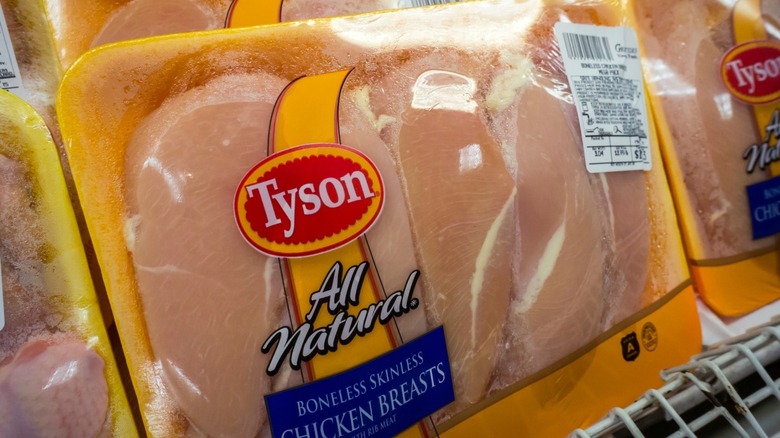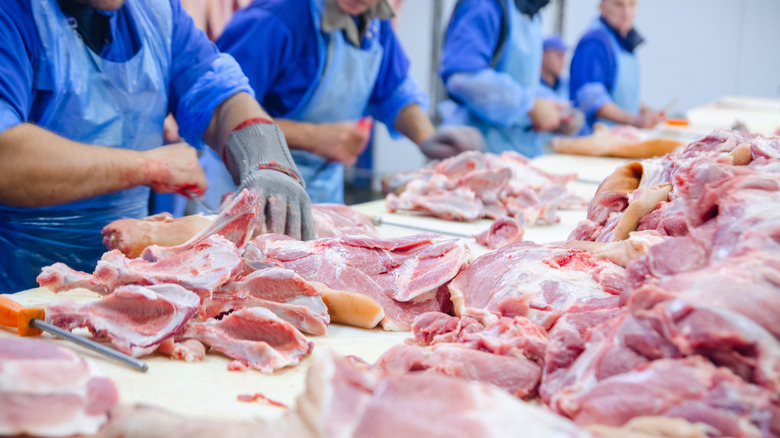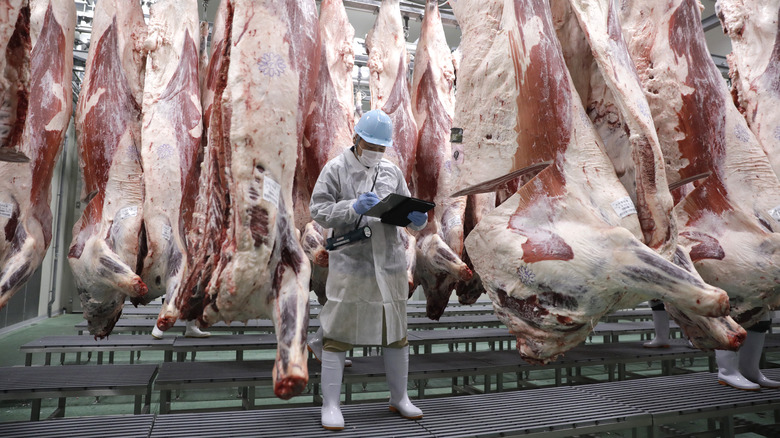Why Tyson And Other Meatpackers Are Under Fire From The Government
Even as we move beyond the height of the COVID-19 pandemic, the efforts of those deemed "essential workers" have not been forgotten. In fact, the plight of some was taken up as a catalyst for governmental reform by the House of Representatives' Select Subcommittee on the Coronavirus Crisis. In a report released May 12, 2022, the Subcommittee examined the process by which the U.S. meatpacking industry and its five major players, Tyson, JBS, Cargill, Smithfield, and National Beef Packing, secured "essential" status from the Trump Administration for the purpose of keeping their plants open amid mounting evidence of the serious risk to public health, not to mention, the health and safety of individuals.
As the subcommittee noted in its executive summary, the granting of essential status to the meatpacking industry required meatpackers to work in unsafe conditions that ultimately resulted in 59,000 COVID-19 diagnoses and 269 deaths. Nevertheless, the investigation that led to the subcommittee's report suggests that it's not at all clear from the facts that the meatpacking industry was, in fact, "essential" during the pandemic.
What is clear from the report is that meatpacking industry giants like Tyson Foods leveraged their considerable influence to garner "essential" status, despite that it not necessarily being prudent. The report, which criticizes Trump's Administration for making the designation, is, in essence, a call for government reform in the handling of future crises of this kind. However, Tyson and its fellow meatpacking industry behemoths have now been placed in the hot seat.
Tyson and other meatpacking giants have explaining to do
The House Select Subcommittee on the Coronavirus Crisis commenced investigating the propriety of the meatpacking industry's having been granted essential status by the Trump Administration when reports began to emerge alleging that some of the biggest meatpacking industry players failed to take proper precautions on behalf of their workers, according to its recently published report, "How The Trump Administration Helped the Meatpacking Industry Block Pandemic Worker Protection."
What was found over the course of the investigation was that the meatpacking industry knew of the "high risks of coronavirus spread in their plants" but "engaged in a concerted effort with Trump Administration political officials to insulate themselves from coronavirus-related oversight." The upshot was that workers were forced to choose between their jobs and the prospect of illness and death due to COVID-19.
The report, which is not a call for legal action against the meatpacking industry, but rather a call for governmental reform, goes on to cite examples of the five meatpacking giants and their respective executives engaging in various behind-the-scenes machinations for the sake of continuing to run their businesses without interruption in the midst of the pandemic — even if doing so could harm many without justifiable benefit. Although none of these machinations would have been possible without the complicity of the Trump Administration, some of the actions taken by Tyson, its peers, and their various executives may make you cringe a little.
The government recognizes the meatpacking industry's complicity
The central message of the House of Representatives' Select Subcommittee report, published May 12, 2022, is a call for governmental reform to restrict the latitude by which government agencies possessing significant financial and political ties to powerful industries may allow themselves to be influenced by said industries and their high net worth executives. Nonetheless, the report also makes clear that the financial leverage of industry giants is, itself, a challenge to equitable legislation in the face of public crisis.
For example, Tyson's chief executive took out full-page ads in several major media outlets, including The New York Times and The Washington Post, in which he, on behalf of Tyson, touted the importance of the meatpacking industry to the U.S. food supply, and food security in general, likening its essential nature to "health care," opening up the idea that the poultry industry was in danger. The Washington Post argues that such claims were inaccurate, but the report goes so far as to refer to these claims as "flimsy" if not "outright false."
But as powerful as propaganda can be, the pen may be mightier. According to The New York Times, the executive order by which President Donald Trump declared meatpacking plants to be part of "critical infrastructure" was drafted by none other than the legal department of Tyson. The New York Times further notes that, adding insult to injury, the Trump administration later even bowed to meatpacking industry pressure to "adjust its federal recommendations on worker safety" at meatpacking plants.


